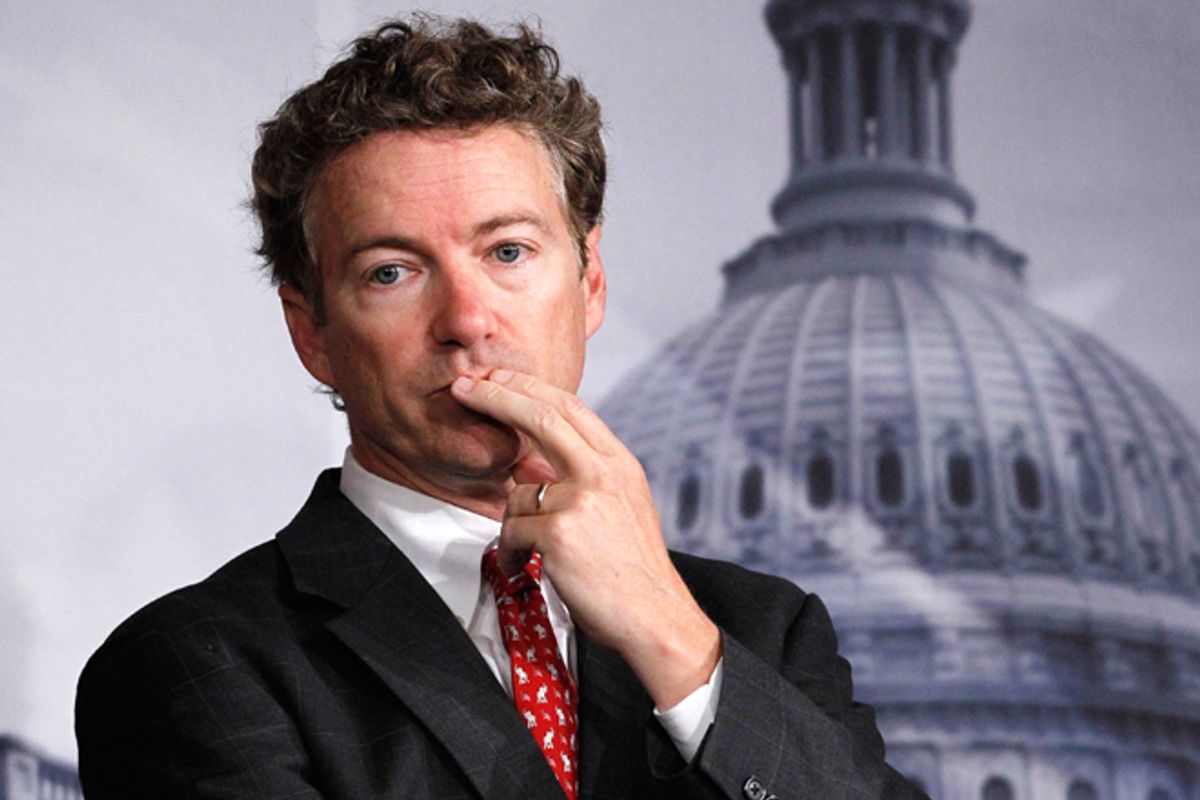National Review’s Robert Costa reported last night that Mitt Romney and Rand Paul had met privately for about 30 minutes in Washington. The speculation over what they might have discussed is mostly focused on this summer’s Republican convention, where delegates loyal (but not necessarily pledged) to Ron Paul will probably control a few hundred slots, with the potential to make some real trouble for Romney.
But as James Hohmann of Politico points out, the sit-down could have much broader, longer-term significance: If Romney ends up winning this year, Rand Paul will immediately become his most obvious threat for a 2016 primary challenge.
With 77-year-old Ron Paul heading off into retirement at the end of this year, Rand Paul is set to become the national face of the libertarian message associated with his family’s name. The assumption is that he’ll ultimately run for president, but the question is when. Unlike his father, Rand seems willing to modulate his message and rhetoric in a way that could expand his appeal within the Republican Party and make him a genuine threat to actually win state primaries and caucuses, something Ron still has never done.
This could make Paul very dangerous to a President Romney, whose ideological purity conservative leaders still doubt. From a governing standpoint, this would give Romney little room for maneuvering, particularly if Republicans control both chambers of Congress. He would be under immense pressure from the right to support and implement their agenda, no matter how politically toxic it is. If Romney were to balk at doing so, or seek some major compromise with Democrats, or simply be seen as not pushing hard enough, he’d be inviting a conservative revolt – and Rand Paul would be a logical figure to lead it.
We’ve seen a dynamic somewhat like this before, back when George H.W. Bush was president. As I’ve written before, there are some striking parallels between how Romney and Bush 41 rose to power – and the suspicion with which their late-in-life embraces of conservatism were viewed by the GOP base. So when Bush cut a deal with Democrats in 1990 to reduce the deficit by raising taxes, conservative activists weren’t eager to give him the benefit of the doubt or to invent some rationalization to go along with him. They revolted, setting off an intraparty war that damaged Bush’s presidency and produced a 1992 primary challenge from Pat Buchanan. (Before Buchanan jumped in, there had been talk that Bush would instead be challenged by a then-former Texas congressman named Ron Paul.)
At least Bush had some wiggle room, though. When he was president, the GOP was evolving into the absolutist conservative party it now is, but there were still plenty of genuine Republican moderates and an awful lot of pragmatists on Capitol Hill. Romney wouldn’t have that luxury. The party and its congressional representatives are far more uniformly conservative today, and whatever instinct Republican members of Congress have for compromise is quickly being snuffed out by the threat of primary challenges.
The threat of a ’16 campaign by Rand Paul – or another prominent conservative – is one that would haunt a Romney presidency and is the best reason to doubt that Romney’s old flair for moderation will return if he’s in the White House.



Shares